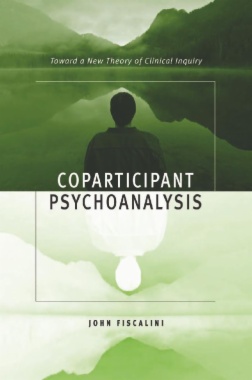Traditionally, two clinical models have been dominant in psychoanalysis: the classical paradigm, which views the analyst as an objective mirror, and the participant-observation paradigm, which views the analyst as an intersubjective participant-observer. According to John Fiscalini, an evolutionary shift in psychoanalytic consciousness has been taking place, giving rise to coparticipant inquiry, a third paradigm that represents a dramatic shift in analytic clinical theory and that has profound clinical implications.
Coparticipant inquiry integrates the individualistic focus of the classical tradition and the social focus of the participant-observer perspective. It is marked by a radical emphasis on analysts' and patients' analytic equality, emotional reciprocity, psychic symmetry, and relational mutuality. Unlike the previous two paradigms, coparticipant inquiry suggests that we are all inherently communal beings and, yet, are simultaneously innately self-fulfilling, unique individuals. The book looks closely at the therapeutic dialectics of the personal and interpersonal selves and discusses narcissism—the perversion of the self—within its clinical role as the neurosis that contextualizes all other neuroses. Thus the goal of this book is to define coparticipant inquiry; articulate its major principles; analyze its implications for a theory of the self and the treatment of narcissism; and discuss the therapeutic potential of the coparticipant field and the coparticipant nature of transference, resistance, therapeutic action, and analytic vitality. Fiscalini explores "analytic space," which marks the psychic limit of coparticipant activity; the "living through process," which, he suggests, subtends all analytic change; and "openness to singularity," which is essential to analytic vitality.
Coparticipant Psychoanalysis brings crucial insights to clinical theory and practice and is an invaluable resource for psychoanalysts and therapists, as well as students and practitioners of psychology, psychiatry, and social work.
- Table of Contents
- Preface
- Acknowledgments
- Introduction: Psychoanalytic Paradigms,
Clinical Controversy, and Coparticipant Inquiry
- PART I: COPARTICIPATION
- 1. Coparticipation and
Coparticipant Inquiry
- 2. Core Principles of
Coparticipant Inquiry
- 3. The Evolution of Coparticipant
Inquiry in Psychoanalysis
- PART II:
THE SELF
- 4. The Multidimensional Self
- 5. Clinical Dialectics of the Self
- PART III: NARCISSISM
- 6. The Self and Narcissism
- 7.
Clinical Narcissism:
Psychopathology of the Self
- 8. Coparticipant Inquiry
and Narcissism
- 9. Narcissistic Dynamics and
Coparticipant Therapy:
Further Considerations
- PART IV: EXPLORATIONS IN THERAPY
- 10. Openness to Singularity:
Facilitating Aliveness in Psychoanalysis
- 11. Therapeutic Processes in the
Analytic Working Space
- 12. Coparticipant Transference
Analysis
- 13. Living Through
- Notes
- References
- Index

